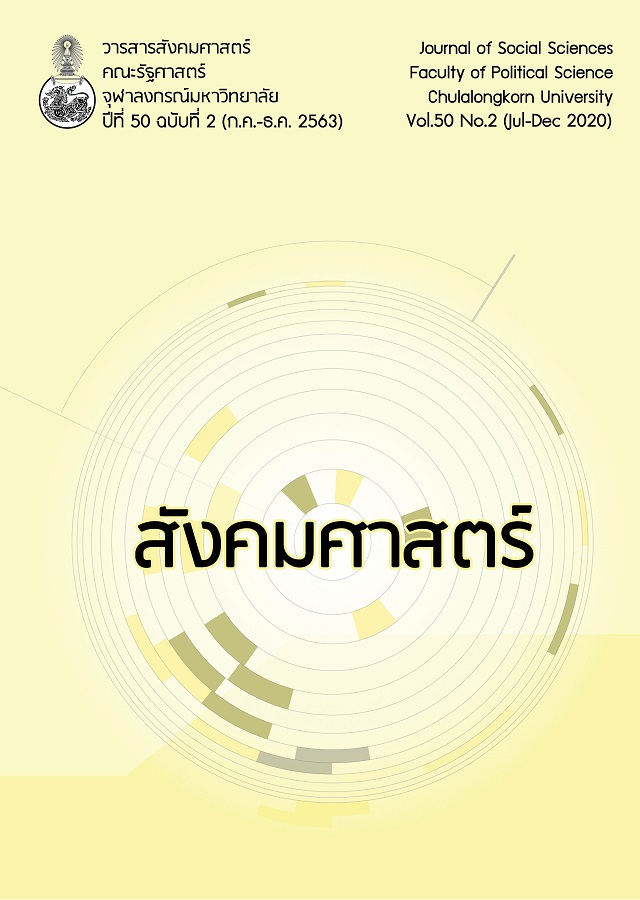การสังเคราะห์ทางอาชญาวิทยาของอาชญากรรมการฆ่าล้างเผ่าพันธุ์
DOI:
https://doi.org/10.61462/cujss.v50i2.704คำสำคัญ:
อาชญาวิทยา, อาชญากรรมการฆ่าล้างเผ่าพันธุ์บทคัดย่อ
การพิจารณาอาชญากรรมการฆ่าล้างเผ่าพันธุ์ซึ่งถูกกล่าวขานว่าเป็น “ที่หนึ่งในบรรดาอาชญากรรมทั้งหลาย” นั้นมักอยู่บนพื้นฐานของหลักกฎหมาย โดยอาชญากรรมการฆ่าล้างเผ่าพันธุ์ในเชิงนิติศาสตร์นั้นถูกวิพากษ์โดยนักสังคมศาสตร์ว่ามีลักษณะที่จำกัดเกินไป จึงนำไปสู่แนวคิดการบูรณาการความรู้ทางด้านนิติศาสตร์เข้ากับทฤษฎีทางอาชญาวิทยาเพื่อที่จะแก้ปัญหาเหล่านี้ เนื่องจากศาสตร์ทางด้านอาชญาวิทยาได้ศึกษาสาเหตุของอาชญากรรมไว้หลากหลายรูปแบบ และเป็นประโยชน์อย่างมากในการอธิบายถึงสาเหตุของการเกิดอาชญากรรมประเภทต่าง ๆ บทความนี้จึงจะให้ความสำคัญแก่การสังเคราะห์บทศึกษาเกี่ยวกับสาเหตุของการประกอบอาชญากรรมการฆ่าล้างเผ่าพันธุ์โดยเฉพาะในมุมมองอาชญาวิทยาเป็นสำคัญว่ามีนัยอย่างไรต่อการทำความเข้าใจเรื่องอาชญากรรมการฆ่าล้างเผ่าพันธุ์ในทางอาชญาวิทยายังไม่มีทฤษฎีใดที่ได้รับการยอมรับโดยดุษณี แต่จากแนวคิดและทฤษฎีที่ถูกศึกษาในเบื้องต้นนั้นก็เป็นคุณูปการต่อเสริมสร้างความเข้าใจต่อสาเหตุและแบบแผนของอาชญากรรมการฆ่าล้างเผ่าพันธุ์เป็นอย่างมาก โดยชี้ให้เห็นถึงลักษณะของอาชญากรรมที่เกิดจากความขัดแย้งระหว่าง “กลุ่ม” โดยฝ่ายผู้ประกอบอาชญากรรมมักเชื่อว่าเหยื่อเป็นสาเหตุให้เกิดปัญหาทั้งหลาย ผนวกกับปัจจัยที่ก่อให้เกิดเป็นเจตจำนงร่วมกันในการกระทำผิดของกลุ่ม ทั้งปัจจัยในเชิงมหภาคที่ก่อให้เกิดผลในระดับจุลภาค จึงส่งผลให้ผู้กระผิดตัดสินใจประกอบอาชญากรรม
Downloads
เอกสารอ้างอิง
Alvarez, Alaxander. 2009. “Genocidal Crimes (Key Ideas in Criminology).” Taylor and Francis. Kindle Edition.
Anderson, Kjell. 2011. “The Dehumanisation Dynamic: A Criminology of Genocide.” PhD diss., Irish Centre for Human Rights, National University of Ireland. Accessed February 10, 2019. https://aran.library.nuigalway.ie/bitstream/handle/10379/2246/Kjell%20Anderson%20PhD%20Thesis.pdf?sequence=1.
BBC. 2014. “Rwanda Genocide: 100 Days of Slaughter”. Accessed February 10, 2019. https://www.bbc.com/news/world-africa-26875506.
Brannigan, Augustine, and Kelly. H. Hardwick. 2003. “Genocide and General Theory.” In Control Theories of Crime and Delinquency, edited by C. L. Britt and M.R. Gottfredson, 109-131. New Brunswick, New Jersey: Transaction.
Chirot, Daniel, and Clark McCauley. 2010. Why Not Kill Them All?: The Logic and Prevention of Mass Political Murder. Princeton University Press.
Day, L. Edward, and Margaret Vandiver. 2000. “Criminology and Genocide Studies: Notes on What Might Have Been and What Still Could Be.” Crime, Law and Social Change 34: 43-59.
DiPietro, Stephanie M. 2016. “Criminology and War: Where Are We Going and Where Have We Been?” Sociology Compass 10(10): 839-848.
Fein, Helen. 1979. Accounting for Genocide: National Responses and Jewish Victimization during the Holocaust. New York: The Free Press.
Hagan, John, and Wenona Rymond‐Richmond. 2009. Darfur and the Crime of Genocide. New York, NY: Cambridge University Press.
Hansler, Jennifer. 2018. “House Says Myanmar Crimes against Rohingya Are Genocide.” CNN. Accessed February 10, 2019. https://edition.cnn.com/2018/12/13/politics/house-resolution-myanmar-genocide/index.html.
Hiebert, Maureen S. 2013. “Questioning Boundaries: What’s Old and What New in Comparative Genocide Theory.” In Genocide Matters: Ongoing Issues and Emerging Perspectives, edited by J. Apsel and E. Verdeja. New York: Routledge.
Independent International Fact-Finding Mission on Myanmar (IIFFM). 2018. “Report of the Independent International Fact-Finding Mission on Myanmar.” Advance edited version. Human Rights Council 39th Session. A/HRC/39/64. https://ap.ohchr.org/Documents/ dpage_e.aspx?si=A/HRC/39/64.
International Center for Transitional Justice. 2018. “Sudan.” Accessed February 10, 2019. https://www.ictj.org/our-work/regions-and-countries/sudan.
International Criminal Tribunal for the former Yugoslavia (ICTY). 2018. “ICTY Remembers: The Srebrenica Genocide 1995-2015.” Accessed February 10, 2019. https://www.irmct.org/specials/srebrenica20.
-----. 2017. “ICTY Convicts Ratko Mladić for Genocide, War Crimes and Crimes against Humanity.” Accessed February 10, 2019. http://www.icty.org/en/press/icty-convicts-ratko-mladi%C4%87-for-genocide-war-crimes-and-crimes-against-humanity.
Kelman, Herbert C. 1973. “Violence without Moral Restraint: Reflections on the Dehumanization of Victims and Victimizers.” Journal of Social Issues 29(4): 25-61.
“Kham Tatsin Prawattisat 2 Phunam Khamen Daeng 'Khiao Samphan - Nuan Chia' Phid Than Kha Lang Phaophan.” [A Historical Judgment against Two Khmer Rouge Leaders ‘Khieu Samphan - Nuon Chea’ for Committing Genocide]. 2018. Thaipost, November 16, 2018. https://www.thaipost.net/main/detail/22096 (in Thai)
Krit Satidwattananon. 2010. “Kotmai Atyakam To Manutsayachat: Praden Phuenthan Thang Kotmai.” [Crimes against Humanity: Basic Legal Issues]. OK Nation (blog), April 19, 2012. http://oknation.nationtv.tv/blog/polkrisd/2012/04/19/entry-1. (in Thai)
Lemkin, Raphael. 1944. Axis Rule in Occupied Europe: Laws of Occupation, Analysis of Government, Proposals for Redress. Washington DC: Carnegie Endowment for International Peace.
Maier-Katkin, Daniel, Daniel P. Mears, and Thomas J. Bernard. 2009. “Towards a Criminology of Crimes against Humanity.” Theoretical Criminology 13(2): 227–255.
Matsueda, Ross L. 2006. “Differential Social Organization, Collective Action, and Crime.” Crime, Law and Social Change 46(1-2): 3–33.
McEvoy, Kieran. 2007. “Beyond Legalism: Towards a Thicker Understanding of Transitional Justice.” Journal of Law and Society 34(4): 411–440.
“‘Nazi Sueksa’ Tiphae Atyakam To Manutsayachat Hitler Khuen Su Amnat Phro Khon Buea Prachathippatai.” [“Nazi Studies” An Explanation of Crime against Humanity, Hitler’s Rise to Power When People Bored of Democracy]. 2017. Prachatai, March 11, 2017. https://prachatai.com/journal/2017/03/70525. (in Thai)
Perry, Barbara. 2003. “Accounting for Hate Crime: Doing Difference.” In Hate and Bias Crime: A Reader, edited by Barbara Perry, 97–109. London: Routledge.
Pruitt, William R. 2014. “How Criminology Can Engage in the Theorizing on Genocide?” International Journal of Criminal Justice Sciences 9(1): 1-15.
-----. 2015. “Testing Hagan and Rymond-Richmond’s Collective Action Theory of Genocide.” Global Crime 16(1): 1-18.
Roberts, Paul, and Nesam McMillan. 2003. “For Criminology in International Criminal Justice.” Journal of International Criminal Justice 1(2): 315-338.
Savelsberg, Joachim J. 2010. Crime and Human Rights: Criminology of Genocide and Atrocities. London: Sage.
Siegel, Larry J. 2011. Criminology: The Core. 5th ed. Stamford: Cengage Learning.
Smeulers, Alette, and Lotte Hoex. 2010. “Studying the Microdynamics of the Rwandan Genocide.” The British Journal of Criminology 50(3): 435-454.
Staub, Ervin. 1999. “The Roots of Evil: Social Conditions, Culture, Personality, and Basic Human Needs.” Personality and Social Psychology Review 3(3): 179–192.
-----. 2011. Overcoming Evil: Genocide, Violent Conflict and Terrorism. Oxford: Oxford University Press.
-----. 2012. “The Roots and Prevention of Genocide and Related Mass Violence.” In The Slippery Slope to Genocide: Reducing Identity Conflicts and Preventing Mass Murder, edited by Mark Anstey, Paul Meerts and I. William Zartman. New York: Oxford University Press.
Thailand. Ministry of Foreign Affairs, Department of ASEAN Affairs. n.d. “Genocide.” Accessed November 10, 2018. http://www.mfa.go.th/asean/th/ code?c=g. (in Thai)
United Nations Office on Genocide Prevention and the Responsibility to Protect. 2018. “Crimes against Humanity: Background.” Accessed February 10, 2019. https://www.un.org/en/genocideprevention/crimes-against-humanity.shtml.
Valentino, Benjamin. 2004. Final Solution: Mass Killing and Genocide in 20th Century. NY: Cornell University Press.
Vianney-Liaud, Mélanie. 2014. “Emerging Voices: Controversy on the Definition of the Cambodian Genocide at the ECCC.” Accessed February 10, 2019. http://opiniojuris.org/2014/ 08/20/emerging-voices-controversy-definition-cambodian-genocide-eccc.
Wald, Patricia M. 2007. “Genocide and Crimes against Humanity.” Global Studies Law Review 6(3): 621-633.
Waller, James. 2007. Becoming Evil: How Ordinary People Commit Genocide and Mass Killing. 2nd ed. New York: Oxford University Press.
ดาวน์โหลด
เผยแพร่แล้ว
รูปแบบการอ้างอิง
ฉบับ
ประเภทบทความ
สัญญาอนุญาต
ลิขสิทธิ์ (c) 2020 คณะรัฐศาสตร์ จุฬาลงกรณ์มหาวิทยาลัย

อนุญาตภายใต้เงื่อนไข Creative Commons Attribution-NonCommercial-NoDerivatives 4.0 International License.
เงื่อนไขการอนุญาตสาธารณะ
นโยบายลิขสิทธิ์และการอนุญาต
วารสารสังคมศาสตร์ จุฬาลงกรณ์มหาวิทยาลัย เผยแพร่เนื้อหาทั้งหมดภายใต้ สัญญาอนุญาตครีเอทีฟคอมมอนส์แบบแสดงที่มา-ไม่ใช้เพื่อการค้า-ไม่ดัดแปลง 4.0 นานาชาติ (CC BY-NC-ND 4.0)
ลิขสิทธิ์
บทความทั้งหมดที่ตีพิมพ์ในวารสารสังคมศาสตร์ จุฬาลงกรณ์มหาวิทยาลัย เป็นลิขสิทธิ์ของ คณะรัฐศาสตร์ จุฬาลงกรณ์มหาวิทยาลัย ผู้เขียนจะโอนสิทธิ์ทั้งหมดให้แก่วารสารเมื่อบทความได้รับการตอบรับให้ตีพิมพ์
สัญญาอนุญาต CC BY-NC-ND 4.0
ภายใต้สัญญาอนุญาตนี้:
-
แสดงที่มา (BY): ผู้ใช้ต้องแสดงที่มาโดยอ้างอิงถึงผู้เขียน คณะรัฐศาสตร์ จุฬาลงกรณ์มหาวิทยาลัย และวารสารสังคมศาสตร์ จุฬาลงกรณ์มหาวิทยาลัย พร้อมทั้งให้ลิงก์ไปยังสัญญาอนุญาต และระบุหากมีการเปลี่ยนแปลง ทั้งนี้สามารถทำได้ในลักษณะที่สมเหตุสมผล แต่ต้องไม่ทำในลักษณะที่แสดงว่าผู้อนุญาตให้การรับรองผู้ใช้หรือการใช้งานดังกล่าว
-
ไม่ใช้เพื่อการค้า (NC): ผู้ใช้ไม่สามารถใช้เนื้อหาเพื่อวัตถุประสงค์ทางการค้า การใช้งานเชิงพาณิชย์จะต้องได้รับอนุญาตเป็นลายลักษณ์อักษรล่วงหน้าจากผู้เขียนและคณะรัฐศาสตร์ จุฬาลงกรณ์มหาวิทยาลัย
-
ไม่ดัดแปลง (ND): หากผู้ใช้นำเนื้อหาไปรวม ดัดแปลง หรือต่อยอด ผู้ใช้ไม่สามารถเผยแพร่งานที่ดัดแปลงนั้นได้ การดัดแปลงผลงานจะต้องได้รับอนุญาตเป็นลายลักษณ์อักษรล่วงหน้าจากผู้เขียนและคณะรัฐศาสตร์ จุฬาลงกรณ์มหาวิทยาลัย
นโยบายการเข้าถึงแบบเปิด
วารสารสังคมศาสตร์ จุฬาลงกรณ์มหาวิทยาลัย ให้การเข้าถึงเนื้อหาแบบเปิดโดยทันทีตามหลักการที่ว่าการทำให้งานวิจัยสามารถเข้าถึงได้อย่างเสรีแก่สาธารณะจะสนับสนุนการแลกเปลี่ยนความรู้ในระดับโลก ผู้ใช้สามารถอ่าน ดาวน์โหลด คัดลอก เผยแพร่ พิมพ์ ค้นหา หรือเชื่อมโยงไปยังเนื้อหาฉบับเต็มของบทความได้โดยไม่ต้องขออนุญาตล่วงหน้าจากผู้จัดพิมพ์หรือผู้เขียน ทั้งนี้เป็นไปตามสัญญาอนุญาต CC BY-NC-ND 4.0
นโยบายการเก็บบันทึกด้วยตนเอง
ผู้เขียนสามารถเก็บบันทึกบทความฉบับตีพิมพ์สุดท้าย ต้นฉบับที่ส่ง (preprint) หรือฉบับที่ผ่านการประเมิน (postprint) ในคลังสถาบันหรือเว็บไซต์ส่วนตัวได้ โดยต้องมีการอ้างอิงการตีพิมพ์ครั้งแรกในวารสารสังคมศาสตร์ จุฬาลงกรณ์มหาวิทยาลัย พร้อมระบุแหล่งอ้างอิงที่สมบูรณ์และลิงก์ไปยังเว็บไซต์ของวารสาร
การขออนุญาต
สำหรับการใช้งานนอกเหนือจากที่ครอบคลุมโดยสัญญาอนุญาต CC BY-NC-ND 4.0 กรุณาติดต่อ:
กองบรรณาธิการ
วารสารสังคมศาสตร์ จุฬาลงกรณ์มหาวิทยาลัย
คณะรัฐศาสตร์ จุฬาลงกรณ์มหาวิทยาลัย
Email: cusocscij@gmail.com
สำหรับข้อมูลเพิ่มเติมเกี่ยวกับสัญญาอนุญาตครีเอทีฟคอมมอนส์แบบแสดงที่มา-ไม่ใช้เพื่อการค้า-ไม่ดัดแปลง 4.0 นานาชาติ กรุณาเยี่ยมชม: https://creativecommons.org/licenses/by-nc-nd/4.0/deed.th





